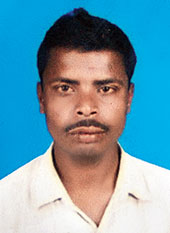 |
| Kurban Shah |
A first-year student of NRS Medical College and Hospital was arrested late on Tuesday for his alleged complicity in the murder of Kurban Shah, a mentally unstable man accused of theft, in the men’s hostel exactly a month ago.
The student, whom police identified as Jasimuddin, had been interrogated for five hours earlier in the day.
“Jasimuddin was arrested at 10.40pm for his complicity in the murder case,” joint commissioner of police (crime) Pallab Kanti Ghosh announced.
Kurban, a 28-year-old resident of Uluberia in Howrah district, was attacked because he had allegedly tried to steal Jasimuddin’s mobile phone from his hostel room on the morning of November 16.
Investigators quoted the arrested student as saying that he found his mobile phone near the corridor on the third floor of the hostel and went back to his room. Kurban was found tied to a pillar on the same floor but Jasimuddin apparently told the interrogators that he didn’t see anyone being lynched.
The police said it was improbable that Jasimuddin wasn’t aware of Kurban being attacked. “We have little doubt about his involvement,” said a senior officer of the homicide department.
He has been charged with common intention and murder, the maximum punishment for which is life imprisonment.
Jasimuddin, who had been interrogated once earlier, is to be produced in court on Wednesday.
In the 30 days since Kurban was found murdered, the police have spoken to 88 NRS students. At least 35 students were on the premises during the murder, sources said.
Metro highlights why it took so long for the police to fix culpability, if not arrest each of those responsible for a mentally unstable man being brutalised to death.
Knowledge
Investigation: For a death to be proved a murder, the key is to establish that the accused knew that the assault being carried out might lead to death. Since the accused in the NRS case are already doctors or medical students, they are all expected to know that hitting a person in particular ways can be fatal, a police veteran said.
Gap: Investigators say they are struggling to establish whose blow was relatively harmless and whose was fatal. Hence, each of the accused has enjoyed the “benefit of the doubt”.
“A person who kills a man and another who encourages him should be held equally culpable. From the condition of the body, there was little doubt that it wasn’t an accidental death. Murder suspects should be arrested immediately and then questioned for their individual role in it,” said a senior IPS officer not attached with the investigation.
Doctors or medical students are expected to recognise the symptoms of a man on the verge of dying. But instead of helping him, they left the victim either to die or watched him being brutalised to death, the officer said.
Motive
Investigation: The police say that a death can be termed a murder if there is a motive, but the NRS suspects apparently did not have one to kill Kurban. “Every murder has to have a motive. Otherwise, it becomes culpable homicide not amounting to murder. We are looking for a probable motive in this case,” an investigator said.
In the event of an accused being charged with culpable homicide not amounting to murder, the implication is that the victim might have been accidentally killed and the accused had no knowledge or motive to commit a murder.
Gap: Police officers not directly involved in the investigation said Kurban’s post-mortem report was self-explanatory. “In culpable homicide not amounting to murder, the victim is not subjected to such a severe assault because the intention is not to kill. Sometimes a single blow can cause death. But this is clearly murder, with or without motive,” a senior officer said.
Kurban was found with 18 injuries, including a fractured pelvic bone, ruptured spleen and blue-black marks on his back, hinting at repeated assault.
Collective responsibility
Investigation: The investigators say they are finding it difficult to zero in on individual involvement, which was the alleged excuse for not making an arrest until Tuesday night.
Gap: Lawyers said sections like common intention and criminal conspiracy (sections 34 and 120B of the IPC) are relevant in cases where more than one offender commits a crime. “Arresting someone in a case of murder doesn’t necessarily mean that he or she would be chargesheeted under the same section. Sections can be amended, based on individual involvement,” a veteran criminal lawyer said.
Waiting for the accused to confess to their crime instead of making arrests based on circumstantial evidence is also unusual, the lawyer said.
Murder weapon
Investigation: The murder weapon — in Kurban’s case, bamboo sticks — plays the crucial role in ascertaining how determined the accused was/were to take a life. “Use of a knife or a gun is a clear indication that the accused had intention to kill. The use of a bamboo stick is less decisive. Assault with a piece of bamboo may not cause death,” an investigator said.
Gap: According to the sequence of events pieced together by the investigation team, Kurban had lost consciousness more than once during the assault. The fact that broken bamboo sticks were recovered from the spot suggest these were used repeatedly, irrespective of the consequences.
“The broken bamboo sticks indicate the desperation behind the assault,” an IPS officer said.










